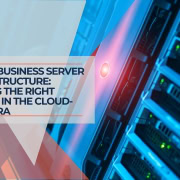Cloud Computing – Critical Issues You Must Know Before Signing Up For One
Last Updated on February 28, 2023
In today's digital world, cloud computing has become an increasingly popular solution for businesses and individuals looking to store and access data remotely. Cloud computing offers many benefits, including cost savings, scalability, and ease of use. However, with these benefits come critical issues that users must be aware of before signing up for a cloud service.
This article will explore the most important issues users should consider when using cloud computing. We will discuss data security, service availability and reliability, compliance and regulations, and vendor lock-in. By understanding these critical issues, users can make informed decisions about the cloud service that best suits their needs while protecting their data and ensuring the service meets their expectations.
Let's dive in and explore the critical issues you must know before signing up for a cloud service.

Table of Contents
Data Security
Data security is one of the most critical issues to consider. Unfortunately, the cloud stores data on remote servers, leaving it vulnerable to security breaches when cyber security is neglected. Many potential vulnerabilities include weak passwords, unpatched software, and insider threats. Here are some strategies for ensuring data security in the cloud:
- Encryption: Data should be encrypted during transit and at rest to prevent unauthorized access. Encryption is essential for protecting sensitive data, such as financial information, personal health information, and intellectual property. Users should ensure that their cloud service provider offers robust encryption capabilities.
- Access control policies: Users should control who can access their data and what they can do with it. Access control policies, such as role-based access control (RBAC) and multi-factor authentication (MFA), can help prevent unauthorized access.
- Monitoring and auditing: It is essential to monitor cloud activity and audit logs to detect suspicious activity. Monitoring tools can alert users to potential security breaches, while auditing can help determine the cause and extent of a breach.
In addition, reviewing the cloud service provider's security policies and procedures is vital to ensure they align with industry best practices.
In the next section, we will discuss the importance of service availability and reliability in the cloud.
Service Availability and Reliability
In the cloud, downtime can significantly affect businesses and users, including lost productivity, revenue, and reputation. For example, in the last couple of months, Microsoft 365 experienced a widespread outage that left users without access to email and Outlook for several hours.
Choosing a cloud service provider with reliable service and plans to mitigate downtime is essential. Here are some strategies for ensuring service availability and reliability in the cloud:
- Redundancy: Redundancy is the duplication of critical components to ensure service continuity in the event of a failure. Users should secure their cloud service provider has redundant servers, storage, and network connections to minimize the impact of downtime.
- Backup and recovery: Users should have backup and recovery plans to restore data after a disaster. Backup and recovery plans should be tested regularly to ensure they are effective and reliable.
- Service level agreements (SLAs): SLAs define the service level that a cloud service provider will deliver. Users should carefully review SLAs to ensure they meet their requirements and have penalties if the provider fails to meet the agreed-upon service level.
Vendor Lock-In
Vendor lock-in occurs when users depend on a single cloud service provider for their infrastructure, applications, or data. This can limit users' flexibility and agility, resulting in higher costs and lower service quality. Here are some strategies for avoiding vendor lock-in:
- Open standards: Users should choose cloud service providers that support open standards for their applications and data. Open standards are publicly available, vendor-neutral specifications that enable interoperability between different systems.
- Multi-cloud approach: Users should consider a multi-cloud strategy that spreads their workloads across multiple cloud service providers. This can help prevent vendor lock-in and ensure service continuity in a provider outage.
- Data portability: Users should be able to move their data and applications between cloud service providers. This requires careful planning and consideration of data formats, protocols, and dependencies.
By avoiding vendor lock-in, users can maintain control over their infrastructure, applications, and data and ensure the flexibility and agility they need to succeed in today's fast-paced business environment.
In the next section, we will discuss the importance of compliance and regulations in the cloud.

Compliance and Regulations
Data types and industries are subject to different regulations and compliance requirements, such as GDPR, HIPAA, PCI-DSS, and SOC 2. Therefore, users must ensure their cloud service provider meets these requirements and has the necessary security controls and procedures.
Here are some strategies for ensuring compliance and regulations in the cloud:
- Data classification: Users should classify their data based on sensitivity, confidentiality, and regulatory requirements. This enables users to apply appropriate security controls and access policies to protect their data.
- Auditing and reporting: Users should audit their cloud service provider's security controls and procedures to meet compliance and regulatory requirements. Users should also require regular reporting from the provider to ensure ongoing compliance.
- Security frameworks: Users should choose cloud service providers that adhere to industry-standard security frameworks, such as NIST, ISO, and CSA. These frameworks provide guidance and best practices for implementing adequate security controls in the cloud.
By ensuring compliance and regulations in the cloud, users can avoid costly fines, legal action, and reputational damage. Reviewing the cloud service provider's compliance and regulatory certifications ensures they align with industry best practices.
In conclusion, understanding these critical issues is essential when signing up for a cloud service. By considering data security, service availability and reliability, compliance and regulations, and vendor lock-in, users can make informed decisions that protect their data, ensure service quality, and enable business agility.
If you're a Miami business owner looking to migrate to the cloud or need expert IT support, iFeeltech is here to help. Contact us today to learn how we can help you navigate the critical issues of cloud computing and ensure the success of your business in the digital age.











Leave a Reply
Want to join the discussion?Feel free to contribute!